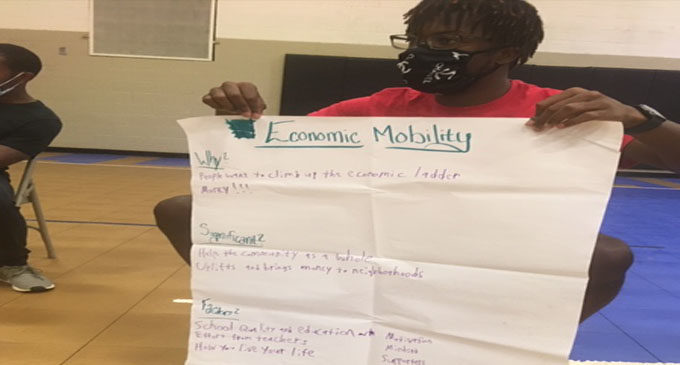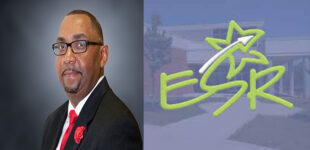Program helps East Winston students confront problems aggravated by pandemic

By John Railey
Public school students across Winston-Salem and Forsyth County are coming to terms with the fact that their first nine weeks, at least, of school will be virtual. For students from underserved families, that adjustment will be all the harder. Their parents will need to ensure that the school system is filling gaps they might have at home in computer and broadband access. These parents working essential jobs outside the home will struggle to find older siblings, relatives and friends to babysit – or be unable to find that help and nervously hope their children will be OK.
In the midst of this pandemic, a summer program sponsored by Winston-Salem State University’s Center for the Study of Economic Mobility (CSEM) aims to help students in East Winston who want an equal shot at climbing the ladder to economic mobility. Called YouthRise (Youth Research in Sustaining Economics), it is based on youth-led participatory research and led by Professor Charity Griffin. The framework of her research centers on listening to and learning from young people, and aims to promote economic mobility by encouraging students to tackle the issues they face. By letting policymakers hear of their concerns, beneficial impact can result.
“The program opens your eyes to what is going on around you,” said one of the participants, Tony, a rising 9th grader (pseudonyms are employed for this story and in Griffin’s research to encourage candidness). The students in the program, called “collaborators,” come from Title I schools in Winston-Salem, schools with high numbers of children from underserved families.
This summer, the student collaborators, along with Griffin, met in several sessions at the Carl Russell Community Center on Carver School Road. They wore masks, followed physical-distancing guidelines, and took their temperatures before each meeting. They chafed at the restrictions, saying the program was not as fun as last year. But they were glad they were able to meet in person instead of by Zoom. They had much to talk about.
Over several classes, WSSU student interns LaDarian Eaton, Tyler Chisolm and Matthew Parker, helped collaborators define their needs: better transportation and teachers, more grocery stores and natural food, better job opportunities, eradication of poverty, more after-school opportunities and recreational outlets, more mentors, more college preparation programs, more government trust in their communities, better health care, more minority police and more sidewalks. Students are encouraged to find ways – through their teachers, parents and others – to get their concerns before officials and policymakers who can address these needs.
“We need more grocery stores in this area,” Tony said. “It’s kind of like a food desert.”
East Winston’s one large grocery store is a Food Lion on New Walkertown Road. Collaborators noted that other areas of the city have multiple grocery stores. And the one store they have, they said, has often been short-stocked during the pandemic.
CSEM research on Census tracts has indicated that, because East Winston is a low-income area, there is little economic incentive for more grocery stores to come to the area. However, CSEM, and Griffin’s program, aim to confront the greater picture as well, looking at why East Winston is a low-income area and what can be done to change that.
Several collaborators noted school inequities. Monica, a rising 10th grader, said, “We need more qualified teachers. We need more textbooks, tablets. There is a lot of stuff we don’t have because we can’t afford it. Certain sides of town, they have more than the side of town we live on.”
Monica and others have experienced firsthand what CSEM research has established in regard to teachers. “Teachers with more experience and education … comprise a much smaller share of the faculty at low-performing elementary schools that serve more economically disadvantaged children – children who have the greatest need for these kinds of teachers,” CSEM Research Manager Zach Blizard writes in “Teachers, Disadvantaged Students, and School Performance: The Case of Forsyth County Elementary Schools,” a paper that was published earlier this year.
School officials have said they are working to bring the best teachers to under-performing schools. To resolve Internet issues, they have said, they have loaned almost 25,000 Chromebook-style laptops for home use to students in Forsyth County – almost half of the approximately 55,000 students in the system – and 3,400 hotspots. The need for computers and Internet access was anticipated by research by CSEM Research Fellows Alice Etim and James Etim.
In addition to talking about the need for better jobs for adults, one collaborator noted a problem she has encountered finding a job. Shana, a rising senior, said, “I want to work, but I don’t have my birth certificate.” She also said, “A lot of people lack transportation to get to places they want to go.”
A 2018 study commissioned by CSEM found that people who rely on Winston-Salem Transit Authority buses to commute to work spend an average of 12 hours a week on the buses, time that could be spent advancing in their work, as well as time that could be spent helping their children with school. CSEM Director Craig Richardson has said that amounts to a ‘time tax.’ More recent CSEM research has found that the commuting time is especially costly for female riders, who bear the brunt of paying for childcare subsidies. CSEM has found that other cities have enacted viable solutions, such as supplying Uber vouchers.
That is one possible solution to one problem. Fixing all the broken rungs on the ladder of economic mobility will require input from all in the community. Learning how to effectively give that input through individual efforts and community groups must start early. Griffin’s program sets a model for that.
As the meeting closed, Parker, the student intern, told the collaborators, “All of you have potential. Hopefully, in the future, you can give back to your community.”
John Railey is the writer-in-residence at CSEM. He can be reached raileyjb@gmail.com. For more information about CSEM, go to www.wssu.edu/csem.
















